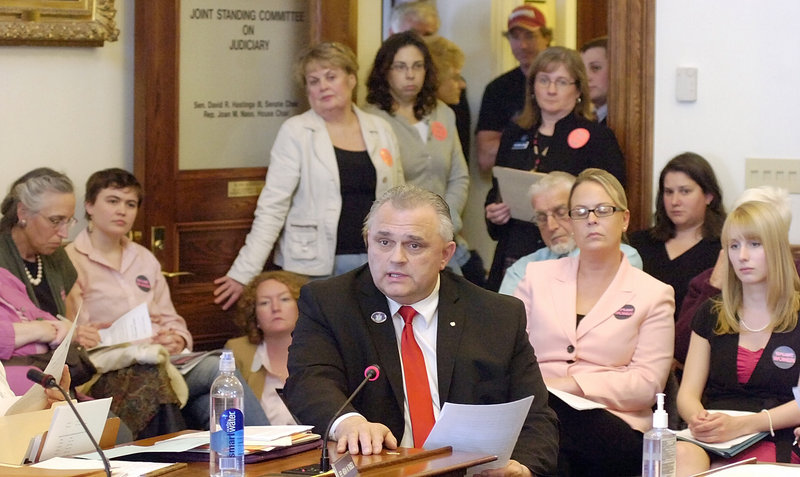AUGUSTA — Anna Spitzinger of Falmouth took her daughter to the microphone when she testified Tuesday before the Judiciary Committee in support of three bills that would change Maine’s abortion laws.
Spitzinger, 24, said that when she went to an abortion provider to explore her options, she was disappointed with how she was treated. “It quickly became clear there was to be no discussion at all, let alone about options,” she said.
The provider told Spitzinger that until her “mind was made up,” she was not allowed to see an ultrasound picture that was taken during the appointment, she said.
“The entire time, there was never an utterance of the term ‘baby’ or ‘fetus,’” Spitzinger said. “Over the next few days, I took the time to learn on my own about the process of an abortion from start to finish, the demands of being a young mother and how an adoption would work.”
She decided to go through with the pregnancy.
Supporters of the three bills say Spitzinger’s experience shows exactly why Maine should adopt reforms.
L.D. 116, sponsored by Rep. Tyler Clark, R-Easton, calls for a 24-hour waiting period before an abortion, except in a medical emergency.
L.D. 924, sponsored by Rep. Eleanor Espling, R-New Gloucester, would require that government-approved information, yet to be developed, be read and given in writing to any woman seeking an abortion at least 24 hours before the abortion.
L.D. 1457, sponsored by Rep. Dale Crafts, R-Lisbon, would require written, notarized parental consent for abortions on women who are minors, with some exceptions.
Maine’s current law requires any girl who is 17 or younger to get consent from her parents, a guardian, an adult family member, a judge or a counselor before getting an abortion.
Groups such as Maine Right To Life, Concerned Women for America of Maine, Americans United for Life and the Roman Catholic Diocese of Portland spoke in support of the measures, which drew a large crowd to the hearing room.
Opponents, including the Maine Medical Association, said Maine law already requires information to be given to women who seek abortions and mandates adult involvement. Others said the bills would erode abortion rights.
Opponents also said Spitzinger’s experience was not typical, and that denying a request to see an ultrasound is illegal.
Abortion providers who don’t comply with the informed consent law are committing a felony, said Shenna Bellows of the Maine Civil Liberties Union. The best way to solve that problem is to prosecute, not change the law, she said.
Speaking of his bill, Clark said, “It’s not my intent to make it harder for a woman to have an abortion. … A simple night’s sleep on a life-altering decision isn’t too much to ask.”
Espling said her bill is “important and necessary for the protection of women.”
“The purpose of this bill is to ensure that women are given as much information as possible in making a truly informed decision about abortion,” she said. “Under the current informed consent law in Maine, this information is available to a woman, but only if she asks for it.”
Crafts said all other medical procedures require parental consent, and so should abortions.
“(My bill) is brought forward to protect the health and welfare of minors and to protect the constitutional right of the parents to rear their children,” he said.
But abortions rights supporters said Maine’s informed consent law, enacted in 1989, doesn’t need to be changed.
“A physician may not perform an abortion unless, prior to the performance, the attending physician certifies in writing that the woman gave her informed written consent, freely and without coercion,” said Dr. Judy Chamberlain of Brunswick, a family physician, quoting the law.
Chamberlain said a physician must tell a woman the number of weeks of her pregnancy, and about the risks associated with her pregnancy and the abortion technique to be performed. A doctor must also inform a woman about alternatives to abortion, upon request.
Opponents said 24-hour requirements are unnecessary because, in most cases, women do wait that long before having the procedure — most get an abortion only after being referred by a health care provider. A waiting period would only create an “undue hardship” for women from rural areas.
Ruth Lockhart, executive director of the Mabel Wadsworth Women’s Health Center in Bangor, said only about two of the approximately 450 abortions the center performed last year were done on the day they were requested.
The clinic is one of only three publicly available centers for women to get abortions in Maine, she said. About 5 percent of the abortion clients are younger than 18, Lockhart said, and all minors have adults witness their consent.
“While we encourage all minors to involve a parent, not all minors can,” she said, “so under Maine’s adult involvement law, a trusted adult is always present — sometimes a grandparent or aunt, adult sibling or even a counselor.”
The committee has scheduled a work session on the measures for May 12.
Earlier Tuesday, abortion rights supporters held a press conference that included several Republican lawmakers, who joined members of the Maine Women’s Lobby, the Maine Civil Liberties Union and two Maine doctors who have performed abortions.
Abortion opponents held a prayer session earlier in the day at the State House.
This story has been updated to reflect L.D. 1457 requires parental consent for women who are minors.
MaineToday Media State House Writer Rebekah Metzler can be contacted at 620-7016 or at:
rmetzler@mainetoday.com
Send questions/comments to the editors.


